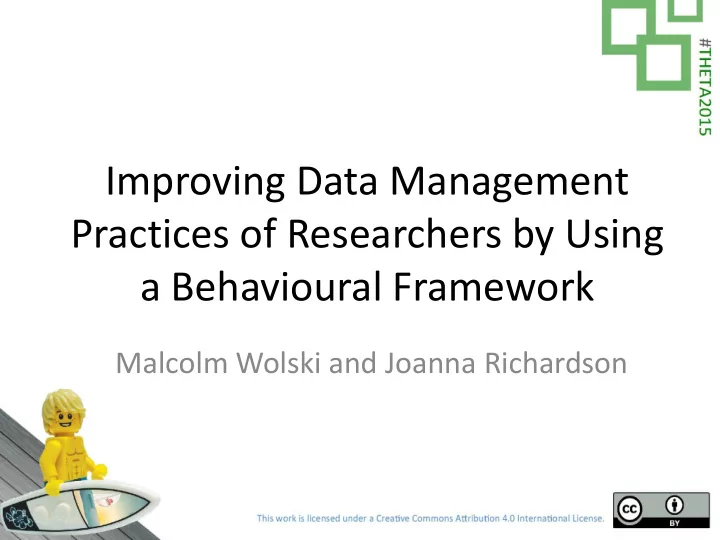

Improving Data Management Practices of Researchers by Using a Behavioural Framework Malcolm Wolski and Joanna Richardson
http://visual.ly/big-data THETA: The Higher Education Technology Agenda. Gold Coast, Australia: 11-13 May 2015 2
http://www.slideshare.net/SusannaSansone/sansone-statement-bdebatetue11nov2014 THETA: The Higher Education Technology Agenda. Gold Coast, Australia: 11-13 May 2015 3
http://www.slideshare.net/itweekend/building-a-data-driven-organization THETA: The Higher Education Technology Agenda. Gold Coast, Australia: 11-13 May 2015 4
http://www.slideshare.net/tobygreen/freemium-open-access-publishing-learning-to-let-go THETA: The Higher Education Technology Agenda. Gold Coast, Australia: 11-13 May 2015 5
http://www.slideshare.net/marilynmann/sharing-clinical-research-data-an-iom-workshop THETA: The Higher Education Technology Agenda. Gold Coast, Australia: 11-13 May 2015 6
http://www.slideshare.net/TERNCOMMS/terns-data-haring-presentation-at-try-workshop THETA: The Higher Education Technology Agenda. Gold Coast, Australia: 11-13 May 2015 7
Risk Management http://eresearch.uws.edu.au/blog/author/alf/ THETA: The Higher Education Technology Agenda. Gold Coast, Australia: 11-13 May 2015 8
http://www.slideshare.net/jmcgross/managing-research-data-new-roles-for-librarians THETA: The Higher Education Technology Agenda. Gold Coast, Australia: 11-13 May 2015 9
https://www.alia.org.au/publications-and-news/australian-library-journal-alj THETA: The Higher Education Technology Agenda. Gold Coast, Australia: 11-13 May 2015 10
http://www.toondoo.com/cartoon/4856032 11 THETA: The Higher Education Technology Agenda. Gold Coast, Australia: 11-13 May 2015
Why behavioural models RESEARCHERS 60.7% reported a formal data management plan but • New Funding 39% reported backing up their data monthly or less 1 Agency Terms Few researchers, especially early career, think about • long-term preservation of their data 2 New Policies and Manuals Demands of publication output overwhelm long-term • considerations of data curation 2 New Services Metadata and documentation are of interest only if • they help a researcher complete his or her work 2 New Systems and Many researchers expressed concerns surrounding the • Infrastructure ethical reuse of research data 2 Lack of time to conduct basic organizational tasks, let • alone time to research best practices or participate in Upskilled staff training sessions 2 Many sceptical of long term interest in their data 2 • 1. O’Reilly, K., Johnson, J., & Sanborn, G. (2012). Improving university research value: a case study. SAGE Open , 2 (3), 2158244012452576. 2. Jahnke, L., & Asher, A. (2012). The problem of data . Washington, DC: Council of Library and Information Resources.
What are behavioural models • Methods developed for studying behaviour • Some are targeted to population groups or problems • Two categories of interest to us o Major Theories of Individual Behaviour / Change o Major Social and Technological Theories of Behaviour / Change http://blogs.scientificamerican.com/mind-guest- blog/2013/06/14/better-behaved-behavioral-models/
Example of Theories of Individual Behaviour / Change Theory Major Tenets Comment Theory of Planned Examines the link between Useful for reinforcing the need • Behaviour (TPB) intention to act and to present information in a way performing a behaviour. which helps shape positive Intention is determined by an attitudes toward behaviours. • individual’s attitude (belief and values about the outcome) and subjective norms. Behaviour is also determined • by an individual’s perceived behavioural control.
Example of Social and Technological Theories of Behaviour / Change Theory Major Tenets Comment Social Cognitive Examines how behaviour, Useful for looking at • Theory (SCT) personal and environmental resources which factors interact to determine could raise self- human functioning. efficacy, determining Major elements which may whether incentives • intervene include self-efficacy, are required, and outcome expectations, recognising reinforcements (something that environmental increases / decreases likelihood a constraints that behaviour will continue), and might deter observational learning (acquiring behaviour change. behaviours by observing others’ behaviour).
A-COM-B framework for understanding behaviour adapted from COM-B model Michie, S., van Stralen, M. M., & West, R. (2011). The behaviour change wheel: a new method for characterising and designing behaviour change interventions. Implementation Science , 6 (1), 42.
Attitude http://www.consumerpsychologist.com/cb_Attitudes.html 18
Capability is the psychological or physical ability to enact the behaviour (Michie et al, 2011, p. 4). This perceived capacity to adopt a behaviour (their self-efficacy) is fundamental to a person taking any action to change their behaviour http://en.wikipedia.org/wiki/Common_sense 19 Michie, S., van Stralen, M. M., & West, R. (2011). The behaviour change wheel: a new method for characterising and designing behaviour change interventions. Implementation Science , 6 (1), 42.
Opportunity is defined as “all the factors that lie outside the individual that make the behaviour possible or prompt it” (Michie et al., 2011, p. 4) http://evolution.berkeley.edu/evolibrary/article//success_09 20 Michie, S., van Stralen, M. M., & West, R. (2011). The behaviour change wheel: a new method for characterising and designing behaviour change interventions. Implementation Science , 6 (1), 42.
Motivation is defined as “all those brain processes that energize and direct behaviour, not just goals and conscious decision-making. It includes habitual processes, emotional responding, as well as analytical decision-making” (Michie at al., 2011, p. 4). 21 Michie, S., van Stralen, M. M., & West, R. (2011). The behaviour change wheel: a new method for characterising and designing behaviour change interventions. Implementation Science , 6 (1), 42.
http://www.personal.psu.edu/afr3/blogs/siowfa12/2012/12/eww-dont-wash-your-hands.html http://www.supportitdesk.com/prevent-copying-to-usb-or-removable-device/
1. Changing behaviours or attitudes? 2. Attitudes and responses change over time 3. Start with the individual – not the service/product 4. Start with the cohort first 5. Where is the opportunity/motivation? 6. Perception of capability is important
Ask a Librarian The Importance of a CRM to target cohort-individual Trial with a small cohort eg a research centre Target HDRs “ Trialling this framework provides an opportunity for our Discipline Librarians to systematically approach and advise researchers of our institutional data storage options and the benefits of tailored storage solutions “
Questions
Recommend
More recommend